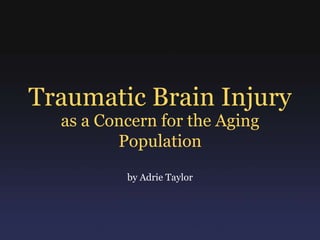
TBI Among Aging Population: Falls Pose Greatest Risk
- 1. Traumatic Brain Injury as a Concern for the Aging Population by Adrie Taylor
- 2. 1.7 million Americans experience traumatic brain injury (TBI) annaully
- 4. Many survivors of TBI may just begin to see the severe repercussions as they enter their senior years.
- 6. intracrannial swelling and pressure
- 7. brain bleeding and bruising
- 8. both axonal and blood vessel damage
- 11. Increased intracrannial pressureAll of these worsening conditions can lead to a risk of stroke. These injuries could be monitored and treated better in the primary stage if one seeks medical attention immediately following the blow, especially for the elderly who are already immunocompromised. left: scan of subdural hematoma
- 13. This is also a good indicator of how bad the injury: the longer the amnesia, the worse the injury.
- 14. The hippocampus is especially vulnerable in a brain injury, which explains why memory loss is so prevalent.
- 16. Contributing to hippocampal atrophy seen in both AD and TBI, amyloid ß plaques are present within hours of TBI, and are a classic sign of AD.
- 18. Dementia pugilistica is a disease which has been known for its prevalence in boxers.
- 20. mTBI (concussions) Although victims of severe brain injuries, athletes, and soldiers are at a particularly high risk for TBI, everyone is at risk for mTBI or concussions. It is almost sure that you or someone you know has suffered a concussion at some point. Just because a concussion is a mild brain injury does not mean it does not have long term effects. Silent symptoms may lurk for years. In one study, victims of mTBI performed worse on every cognitive test than the healthy control subjects six years after the time of injury!
- 21. Elders and TBI: what to do? Seniors are surely the group that TBI threatens the most. Survivors of early injuries deal with the hallmark memory loss related to AD and dementia. More research on Alzheimer's disease and dementia goes on daily. The more researchers learn, the better we can treat these diseases in elderly victims. Seniors are also the biggest risk group for a new TBI with falls being the number one cause. People over age 75 have the highest rate of TBI-related hosptalization and death. As far as new injuries in old age, prevention is key. The Center for Disease Control suggests things like hand rails, non stick mats,bright lighting, and exercise, among other precautions.
- 23. New helmets that record impact are being designed for soldiers.
- 24. Posters regarding the relation between TBI and its symptoms are placed in NFL locker rooms. But we can still do more. Educate your children on helmet safety, educate their coaches on signs and symptoms of brain injury. Help safe guard the homes of elder loved ones, and always encourage anyone who has had a blow to the head to seek medical attention! Thank you and remember, HEADS UP!
